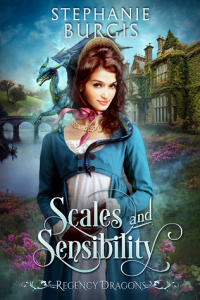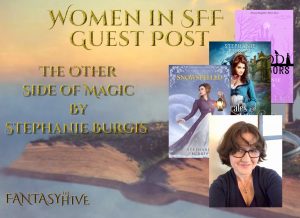The Other Side of Magic: GUEST POST by Stephanie Burgis (SCALES AND SENSIBILITY)
The Other Side of Magic
Stephanie Burgis
As both a reader and a writer, I’ve always loved the pure escapism of fantasy – the way it allows us to leave reality behind and enter a world of more, where the possibilities expand to include real magic and (in my favorite stories) a breathless sense of wonder. I’ve never appreciated that aspect more than when I first became ill (aged 28) with what turned out to be a permanent chronic illness/disability, M.E./CFS [Myalgic encephalomyelitis/chronic fatigue syndrome]. Stuck on a couch for almost all of that first year, unable to stand without waves of vertigo, chills, and fatigue, I escaped into fantasy worlds as if I were leaping into a lifeboat to escape a Titanic-shaped crash.

Before M.E./CFS, I used to love hiking through miles of forest and jogging around my own neighborhood. Since M.E. hit, 17 years ago, it’s been an energy-devouring challenge just to walk around the block. But as a writer, I’ve still been able to write from the perspective of heroines who launch themselves into magical mirrors full of mystery, bargain with dangerous fey enemies, take part in magical masquerades, or fly through the air on dragon-wings. Writing fantasy has provided an incredible escape for me on my worst real-life days…
And it’s also given me a beautiful, sidelong way to grapple with my own disability without losing that sense of escape. This is the great conundrum of the whole #ownvoices issue when it comes to chronic illness or other disabilities: on the one hand, it’s infuriating and hurtful to read ignorant or patronizing descriptions by healthy authors of what they imagine people like us must feel. On the other hand, a lot of writers struggling with these issues in real life use the fiction that we write as a deeply-needed escape from those grinding day-to-day issues. So, the idea of writing a heroine who’s struggling with real M.E./CFS herself has occurred to me a few times over the years only to be dismissed every single time. The truth is, I struggle with this illness enough in my own life – I don’t want to have to deal with it head-on in my fiction, too.
Luckily, it finally occurred to me that fantasy could give me a way to talk about my experiences without having to confront those grinding details head-on. That was how I came to write The Harwood Spellbook series (beginning with Snowspelled), in which Cassandra Harwood, an ambitious and brilliant magician in her late 20s, has lost her ability to do magic through a spell gone horribly wrong. The series itself isn’t grim or depressing at all – it’s frothy and full of romantic comedy, nosy, interfering relatives, massive trolls, dangerous elves, and magical peril – but it begins just as Cassandra is finally emerging from her first overwhelming grief, anger, and loss…an experience that I remember only too well, as someone else who found all of her plans for her future overturned against her will at the same age as Cassandra.
I lost my physical energy in real life; she lost her magical powers in that early-19th-century alt-history. But the overarching story of the series as a whole is Cassandra’s fight to build a new kind of happiness and a future that she might not have imagined before – but that’s full of love (both romantic and familial), hope, and lots of professional satisfaction. And that is a very familiar battle for everyone who’s ever found themselves suddenly facing new physical limitations and a different kind of future.
I’m going to spoil one part for all of you, because it’s too important to leave out. When Snowspelled was first published, a lot of readers were surprised to find that it didn’t end with Cassandra getting her magical powers back, as they’d expected. But I also heard from other readers who were incredibly grateful for that fact – because the truth is, for those of us with chronic illness or other disabilities, we’re just not going to get our health back, either – and the idea that we would have to in order to get a happy ending is just plain toxic.

The great secret of surviving that kind of loss is this: you don’t need to have good physical health to be happy – and just because your future was changed against your will, that doesn’t mean you can’t find a way to rewrite it in a way that works for you. We can all find our own ways to seek joy and fulfilment even with new physical limitations.
When I was 28 and first diagnosed with M.E., I felt as if my own future was irretrievably broken. Now I’m 45, though, I’ve been writing fulltime for years, I have two kids and a husband and a cat I adore, and I’m happier than I ever have been. I still can’t jog or hike through the woods – but I can surround myself with love and family and friends and write fantasy that lets me explore even the hardest parts of my real life in a safe and cathartic way.
I love the escapism that magic provides – but I also love how healing its metaphors can feel. I couldn’t have written Cassandra’s happy ending back when I was first diagnosed with M.E. – but once I’d found my own, it felt wonderfully healing to write hers as well and really show through it what I’d learned myself (while also, of course, including mountain-sized trolls, awkward snowbound houseparties, unexpected romance and lots of humor along the way).
I love writing fantasy.
Stephanie Burgis grew up in the USA but now lives in Wales, surrounded by castles, mountains, and coffeeshops, with her husband (fellow writer Patrick Samphire), their kids, and their very vocal tabbycat. She is the author of wildly romantic historical fantasy novels and novellas for adults (most recently Scales and Sensibility and Good Neighbors: the Full Collection) and fun MG fantasy adventures (most recently The Dragon with a Chocolate Heart trilogy and The Raven Heir). To find out more and read excerpts from all of her books, visit her website: www.stephanieburgis.com You can also find her on Twitter (@stephanieburgis) or Instagram (@stephanieburgisinwales)


[…] The Other Side of Fantasy. Author Stephanie Burgis writes about how reading and writing fantasy helps her cope with chronic illness. (Fantasy Hive) […]
[…] clicking? Copy and paste this URL into your browser:https://fantasy-hive.co.uk/2022/07/the-other-side-of-magic-guest-post-by-stephanie-burgis-scales-and…Powered by […]